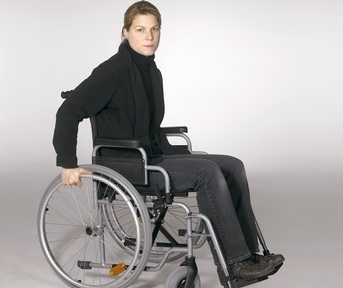'Been hungry a few nights' says disabled person as COVID-19 poll reveals disabled feel 'written off'
Disabled people in lockdown reveal poor access to care, medicine and food is leaving some going hungry and others suicidal, according to a new poll.

Almost half of disabled people and their carers (45 per cent) responding to a poll by Inclusion Scotland, have said COVID-19 has impacted their social care support with 30 per cent reporting their care has either stopped completely or been reduced.
The majority of disabled people (64 per cent), many of whom consider themselves at high risk from COVID-19 have said they are struggling to get the food and the medicine they need.
One disabled person said: “Waiting for parcel delivery from government but been hungry a few nights. A friend from 15 miles away has driven through with emergency supplies and I have let him in.”
'I cannot prove my vulnerability'
Some disabled people have no way of proving their ‘vulnerable’ status or of obtaining food or medicines unless they or someone else at risk, goes out into a shop or a pharmacy.
Another poll respondent said: “We have not received an official 'extremely vulnerable' person letter and my condition is not specifically named in the extreme vulnerability category - my condition is Duchenne Muscular Dystrophy.
“We have had contact with my Respiratory Consultant’s team who have stated that obviously I am included and need to be shielding but that is still not official proof. As I live in Scotland, I cannot get prioritised delivery slots as I cannot prove my vulnerability.”
'Can't stand in queues for long periods'
Many respondents reported difficulties in accessing food because they are not prioritised for home deliveries by supermarkets and when they do go shopping their impairments are not taken into account by supermarket staff.
“Can’t get any slots for online shopping" says another person.
"Can’t get up early for the elderly/vulnerable hours at supermarkets due to the medication I take to help me sleep. Can't stand in queues for long periods of time due to disability and mental health issues. “I have no family members near me who can help. I have no idea what help is available to me as I am not in the highest risk group.”
With the care support for some disabled people being reduced or stopping completely, one woman said: “My son was in residential care but they sent him home and now [he] gets no support. Support has all but stopped other than a few phone calls a week. This has meant me (his sister) and our elderly parents are picking up his care.”
Although some people may have already provided care to family members pre-Covid-19, the current situation is placing a greater strain on carers.
One poll respondent said: “We are all at home now. Two adults with depressive illnesses, 1 adult with ASD, one adult with ASD, ADHD and anxiety and a teenager and a two-year-olds with suspected ASD. We have no respite at all.”
Lockdown is 'triggering'
Inclusion Scotland survey finds public bodies are failing to consider the experiences of disabled people before making decisions.
Social distancing and isolation is proving extremely challenging for disabled people, with and without pre-existing mental health conditions.
Everyday life under lock-down has been extremely stressful, according to the online poll (conducted 1-30 April) with significant numbers of disabled people with existing mental health problems admitting they feel suicidal.
“It’s incredibly traumatic since I have a mental illness as a direct result of multiple traumas, including forced isolation. It’s so triggering.”
Another person said: “I cannot follow these measures. I received the letter to tell me I was in the most vulnerable position medically and to use different towels, bathroom, eating alone etc... my wife brings me my food.
“ I am bedbound. I cannot control who eats where. I have no access to running water for hand washing and I’m onto my last hand sanitiser bottle.”
'I feel written off’ by DNR
Though no question was asked about DNR in the poll, some people said they had been asked to sign Do Not Resuscitate (DNR) notices. Others said they were told they would not be ventilated if they contracted COVID-19.
A poll respondent said: “I have been told already that I would not be ventilated. I was in hospital last week with suspected COVID-19 and the doctor stated I would not be treated. There is no DNR in file but this was put in my discharge letter. I feel written off before I start.”
Another said: “My greatest fear is that, if I were to experience complications from the virus and require admission to hospital, as a disabled person I would not receive the same care that I would as an able-bodied person. I am worried that my life is viewed as less valuable because I'm a wheelchair user."
In response to its poll's results, disability campaigner Inclusion Scotland stated: ‘Disabled people are not just at risk from the virus. We’re at risk from the actions of public bodies and others who don’t understand who we are, what we need or what will work. Why? Because they haven’t asked us.
“Not only will this mean that thousands of us don’t get what we urgently need but getting it wrong costs providers valuable time and money.”
Latest News
 29-Jul-24
Dementia Bus gives carehome.co.uk staff insight into life with dementia
29-Jul-24
Dementia Bus gives carehome.co.uk staff insight into life with dementia
 27-Jul-23
UK's top home care agencies in 2023 revealed
27-Jul-23
UK's top home care agencies in 2023 revealed
 30-Nov-22
A quarter of older people keep their falls secret from family
30-Nov-22
A quarter of older people keep their falls secret from family
 29-Nov-22
'Covid-19 has not gone away' say terminally ill
29-Nov-22
'Covid-19 has not gone away' say terminally ill
 28-Nov-22
IT consultant who received poor care opens 'compassionate' home care business
28-Nov-22
IT consultant who received poor care opens 'compassionate' home care business